Mazda CX-30 vs Peugeot Rifter – Which model is better for everyday use?
Two cars, one duel: Mazda CX-30 meets Peugeot Rifter.
Which one wins in performance, efficiency and value for money? Find out now!
Costs and Efficiency:
Looking at overall running costs, both models reveal some interesting differences in everyday economy.
Peugeot Rifter has a barely noticeable advantage in terms of price – it starts at 23800 £, while the Mazda CX-30 costs 25200 £. That’s a price difference of around 1414 £.
Fuel consumption also shows a difference: Peugeot Rifter manages with 5.60 L and is therefore minimal more efficient than the Mazda CX-30 with 5.70 L. The difference is about 0.10 L per 100 km.
Engine and Performance:
Under the bonnet, it becomes clear which model is tuned for sportiness and which one takes the lead when you hit the accelerator.
When it comes to engine power, the Mazda CX-30 has a clearly perceptible edge – offering 186 HP compared to 136 HP. That’s roughly 50 HP more horsepower.
In acceleration from 0 to 100 km/h, the Mazda CX-30 is noticeable quicker – completing the sprint in 8.30 s, while the Peugeot Rifter takes 10.80 s. That’s about 2.50 s faster.
In terms of top speed, the Mazda CX-30 performs slight better – reaching 204 km/h, while the Peugeot Rifter tops out at 184 km/h. The difference is around 20 km/h.
There’s also a difference in torque: Peugeot Rifter pulls to a small extent stronger with 300 Nm compared to 240 Nm. That’s about 60 Nm difference.
Space and Everyday Use:
Whether family car or daily driver – which one offers more room, flexibility and comfort?
Seats: Peugeot Rifter offers noticeable more seating capacity – 7 vs 5.
In curb weight, Mazda CX-30 is hardly perceptible lighter – 1455 kg compared to 1561 kg. The difference is around 106 kg.
In terms of boot space, the Peugeot Rifter offers significantly more room – 1050 L compared to 430 L. That’s a difference of about 620 L.
In maximum load capacity, the Peugeot Rifter performs clearly better – up to 3500 L, which is about 2094 L more than the Mazda CX-30.
When it comes to payload, Peugeot Rifter evident takes the win – 814 kg compared to 496 kg. That’s a difference of about 318 kg.
Who comes out on top?
Overall, the Peugeot Rifter shows itself to be is largely superior and secures the title of DriveDuel Champion.
It convinces with the more balanced overall package and proves to be the more versatile choice for everyday use.
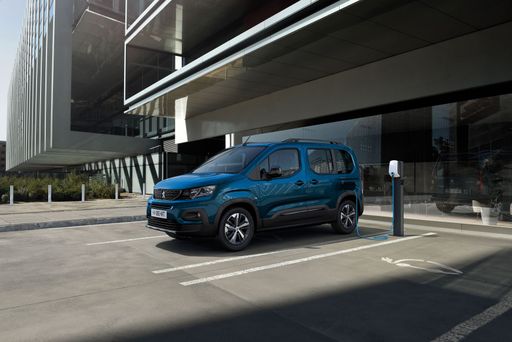
Peugeot Rifter
Mazda CX-30
The Mazda CX-30 effortlessly combines sleek design with a sense of adventure, making it an appealing choice for urban explorers and countryside enthusiasts alike. Inside, the cabin is thoughtfully designed, offering both comfort and cutting-edge technology to enhance the driving experience. Its performance on the road is agile, providing a smooth and engaging journey for drivers and passengers.
details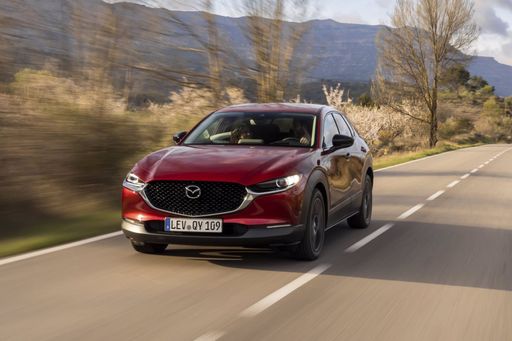 @ de.mazda-press.com
@ de.mazda-press.com
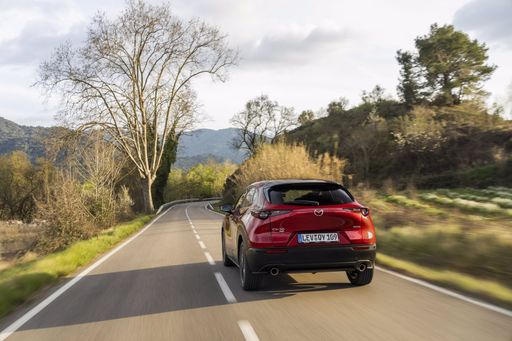 @ de.mazda-press.com
@ de.mazda-press.com
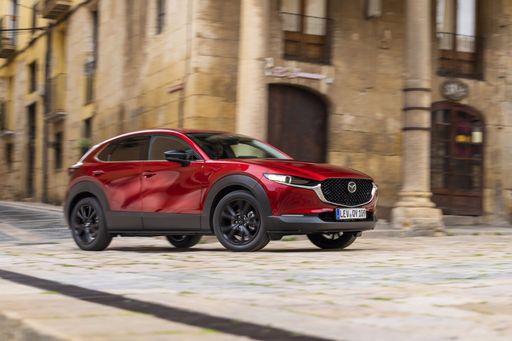 @ de.mazda-press.com
@ de.mazda-press.com
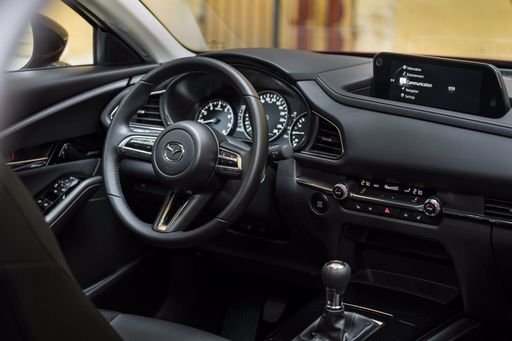 @ de.mazda-press.com
@ de.mazda-press.com
Peugeot Rifter
Der Peugeot Rifter beeindruckt mit seinem robusten Design und seiner hohen Vielseitigkeit, die ihn ideal für Familien und Outdoor-Abenteuer macht. Der Innenraum ist geräumig gestaltet und bietet zahlreiche innovative Technologien, die den Komfort und die Sicherheit der Insassen erhöhen. Zudem überzeugt der Rifter mit seiner hervorragenden Fahrdynamik, die sowohl in der Stadt als auch auf längeren Strecken für ein angenehmes Fahrerlebnis sorgt.
details @ media.stellantis.com
@ media.stellantis.com
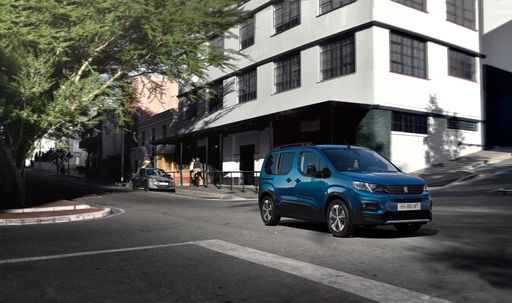 @ media.stellantis.com
@ media.stellantis.com
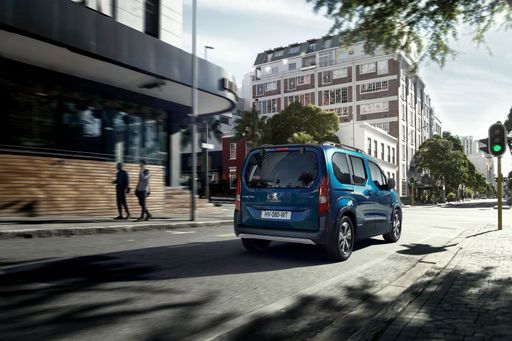 @ media.stellantis.com
@ media.stellantis.com
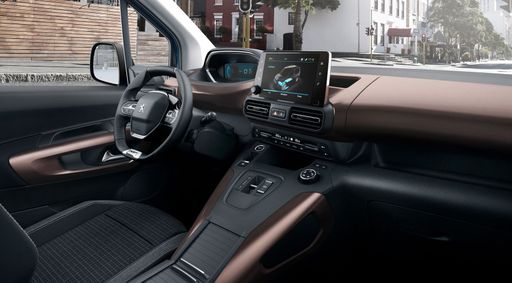 @ media.stellantis.com
@ media.stellantis.com

|

|
|
|
|
Costs and Consumption |
|
|---|---|
|
Price
25200 - 36800 £
|
Price
23800 - 36600 £
|
|
Consumption L/100km
5.7 - 6.6 L
|
Consumption L/100km
5.6 - 6 L
|
|
Consumption kWh/100km
-
|
Consumption kWh/100km
18.3 - 19.1 kWh
|
|
Electric Range
-
|
Electric Range
328 - 339 km
|
|
Battery Capacity
-
|
Battery Capacity
-
|
|
co2
129 - 148 g/km
|
co2
0 - 158 g/km
|
|
Fuel tank capacity
48 - 51 L
|
Fuel tank capacity
50 L
|
Dimensions and Body |
|
|---|---|
|
Body Type
SUV
|
Body Type
High Roof Estate
|
|
Seats
5
|
Seats
5 - 7
|
|
Doors
5
|
Doors
4 - 5
|
|
Curb weight
1455 - 1587 kg
|
Curb weight
1561 - 1941 kg
|
|
Trunk capacity
422 - 430 L
|
Trunk capacity
322 - 1050 L
|
|
Length
4395 mm
|
Length
4405 - 4755 mm
|
|
Width
1795 mm
|
Width
1848 mm
|
|
Height
1540 mm
|
Height
1818 - 1837 mm
|
|
Max trunk capacity
1398 - 1406 L
|
Max trunk capacity
3000 - 3500 L
|
|
Payload
458 - 496 kg
|
Payload
489 - 814 kg
|
Engine and Performance |
|
|---|---|
|
Engine Type
Petrol MHEV
|
Engine Type
Electric, Diesel
|
|
Transmission
Manuel, Automatic
|
Transmission
Automatic, Manuel
|
|
Transmission Detail
Manual Gearbox, Automatic Gearbox
|
Transmission Detail
Reduction Gearbox, Manual Gearbox, Automatic Gearbox
|
|
Drive Type
Front-Wheel Drive, All-Wheel Drive
|
Drive Type
Front-Wheel Drive
|
|
Power HP
140 - 186 HP
|
Power HP
102 - 136 HP
|
|
Acceleration 0-100km/h
8.3 - 10.3 s
|
Acceleration 0-100km/h
10.8 - 13.6 s
|
|
Max Speed
191 - 204 km/h
|
Max Speed
132 - 184 km/h
|
|
Torque
238 - 240 Nm
|
Torque
250 - 300 Nm
|
|
Number of Cylinders
4
|
Number of Cylinders
4
|
|
Power kW
103 - 137 kW
|
Power kW
75 - 100 kW
|
|
Engine capacity
1998 - 2488 cm3
|
Engine capacity
1499 cm3
|
General |
|
|---|---|
|
Model Year
2025
|
Model Year
2024
|
|
CO2 Efficiency Class
D, E
|
CO2 Efficiency Class
A, E, F
|
|
Brand
Mazda
|
Brand
Peugeot
|
What drive types are available for the Mazda CX-30?
The Mazda CX-30 is offered with Front-Wheel Drive or All-Wheel Drive.
The prices and data displayed are estimates based on German list prices and may vary by country. This information is not legally binding.
